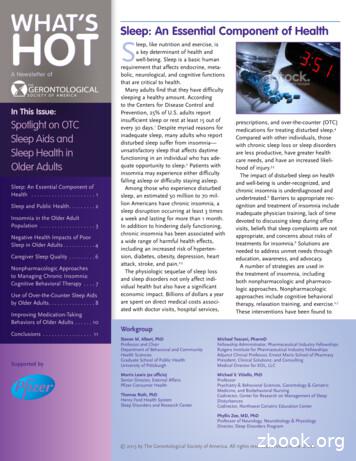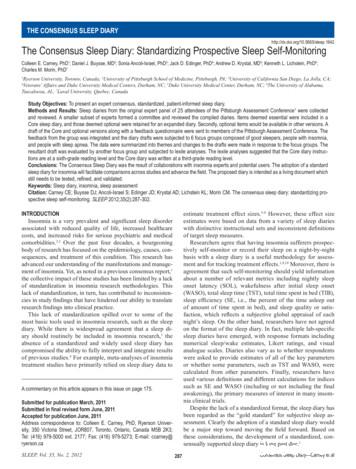Sleep In America Poll 2019 Sleep Health & Scheduling
Sleep in America Poll2019Sleep Health & SchedulingThe latest National Sleep Foundation’s Sleep in America poll finds that good sleep heath is stronglyrelated to sticking to a regular sleep schedule.The poll indicates that Americans frequently depart from their usual bedtimes and wake-up times, andas things stand, less than half the public wakes up feeling extremely or very well-rested. Fifty-eightpercent of Americans went to bed at least half an hour earlier or later than usual on at least oneworkday/weekday in the previous seven days. About half of Americans also reported waking up atleast thirty minutes earlier or later on weekdays and weekends/non-workdays.Maintaining a consistent sleep schedule and feeling well-rested are related; those with the most regularand consistent weekday sleep schedules are about 1.5 times more likely to report feeling well-restedthan their most variable sleep schedule-having counterparts. Fifty-two to 56 percent of Americansreporting the most regular sleep schedules wake up feeling well-rested on weekdays. In comparison,only 34 to 38% of those with the most varied sleep times report the same.SLEEP VARIABILITY, SLEEP HEALTH, AND FEELING EXTREMELY/VERY WELL-RESTEDAllWeekday bedtimeDid not deviate30 minutes to 1 hourMore than an hourWeekday wake timeDid not deviate30 minutes to 1 hourMore than an hourWeekend bedtimeDid not deviate30 minutes to 1 hourMore than an hourWeekend wake timeDid not deviate30 minutes to 1 hourMore than an hourAverageSHI Score77Well-rested, weekdays(%)47Well-rested, 07670524534615040807570544237604846
The Sleep in America poll was run alongside the National Sleep Foundation’s validated sleep healthassessment tool, the Sleep Health Index , which has been fielded quarterly since 2016. The Index isbased on measures of sleep duration, sleep quality and disordered sleep. American adults scored anaverage of 77 on its 0-100 scale. Scores were an average of 6 to 11 points higher for those with themost regular sleep times than for those with the most variable bedtimes or wake times, indicatingnotably better sleep health (80-81 vs. 70-74).Sleep scheduling also affects productivity as well as physical and emotional well-being. However,results of the Sleep in America poll reveal that only 29 to 42 percent of Americans say that variation intheir regular sleep schedules by an hour or more negatively affects how they feel physically andemotionally as well as how much they feel they can accomplish the next day. (This includes those whoreport a great deal, a good amount or, mostly, “just some” effect.)Closer examination of respondents who report actually deviating from their usual sleep schedules bymore than an hour revealed significantly more reports of effects on their productivity as well as howthey feel physically than their sleep schedule-adhering counterparts. Among respondents who deviatedfrom their usual bedtimes or wake times by more than an hour, 39 to 46 percent report effects ontheir productivity the next day, compared to 26 to 27 percent of those who kept their usual bedtimesor wake times. Similarly, 48 to 57 percent of those with the most variable sleep times report an effecton how they feel physically the next day, compared with 34 to 38 percent of those who stuck to theirusual sleep times. These data suggest that maintaining a consistent sleep schedule has a positive andprotective effect against certain consequences on occasions when we need to deviate from our normalsleep schedules by an hour or more.PhysicalEffect(%)Worknight bedtimeDid not deviateDeviated 1 hourWorknight wakeupDid not deviateDeviated 1 hourWeekend bedtimeDid not deviateDeviated 1 hourWeekend wakeupDid not deviateDeviated 1 hourEmotional 2746365425332740375526352745Varied Sleep SchedulesOnly 30 percent of Americans report sticking to their usual weekday bedtimes and wake times eachday of the previous week. This value rises to 38 percent for weekend bedtimes and wake times.2
For the near 70 percent of others, variations in schedule are typically by less than an hour. Four in 10respondents deviated from their usual weekday bedtime by a half hour to an hour, 12 percent by oneto two hours and 6 percent by more than two hours.Those with “excellent” sleep health, per the Sleep Health Index, are nearly 2.5 times more likely to keepa regular bedtime schedule than those with “poor” sleep health. Forty-three percent of those in thetop 25 percent of Index scores, maintained a regular weekday bedtime schedule. Among thoserespondents in the lowest 25 percent of Index scores, only 17 percent kept a regular bedtime schedule.Similarly, those with “excellent” sleep health were about two times more likely to report sticking toregular weekend sleep times in comparison to those with “poor” sleep health (52% vs. 27%,respectively).CONSISTENT BEDTIME AND WAKE TIMESWeekdays(%)All30SHI QuartileHighest quartile (“Excellent”)43nd2 quartile (“Good”)35rd3 quartile (“Fair”)23Lowest quartile (“Poor”)17Weekends(%)3852383427NapsAnother way people alter their sleep schedules is by taking naps. Four in 10 respondents reportedintentionally napping at least once in the previous week. Eleven percent of poll respondents took napson at least five of the past seven days.Napping also revealed a strong relationship with overall sleep health. About 30% of those with“excellent” sleep health chose to take a nap in the past week. Those with “poor” sleep health were3
1.5 times more likely to report taking a nap in the past week. This result suggests a possibility thatthose with “poor” sleep health recognize the need to supplement their sleep with an additional nap.Those who did not report taking a nap in the past week scored an average of more than ten pointshigher on the Sleep Health Index than those who took naps on six or all seven days (79 vs. 68,respectively). This gap is primarily driven by large differences in the sleep quality (74 vs. 59,respectively) and disordered sleep indices (84 vs. 71).DAILY INTENTIONAL NAP FREQUENCY AND SLEEP HEALTHAll# of DaysNoneOneTwoThree to fiveSix or 871Feeling Well-RestedAfter a typical weeknight’s sleep, 47 percent of Americans report waking and feeling extremely or verywell-rested; 37 percent report feeling somewhat well-rested and 15 percent report feeling less wellrested than that. Things improve slightly on the weekend with 54 percent feeling extremely or verywell-rested, 33 percent feeling somewhat well-rested and 12 percent feeling less well-rested.The question further supports the importance of the Sleep Health Index and its methodology. Thosewith “excellent” sleep health are nearly 3.5 times more likely to report feeling well-rested on a typicalweekday in comparison to those with “poor” sleep health (76% vs. 22% respectively).TYPICALLY FEELING WELL-RESTED ON WEEKDAYSBY SHI QUARTILEOverallSHI QuartileHighest quartile (“Excellent”)2nd quartile (“Good”)3rd quartile (“Fair”)Lowest quartile (“Poor”)Feel well-rested(%)47765536224
Group DifferencesThere also are differences among groups. Feeling well-rested on a typical weekday peaks at 56 percentamong seniors, compared with a low of 41 percent of 18- to 29-year-olds. Forty-four percent of whitesreport feeling well-rested as compared to 52 percent of nonwhites. Just 39 percent of parents wake upfeeling well-rested during the week, compared with 50 percent of non-parents (43% vs. 58%,respectively on weekends). Feeling well-rested is especially low among those who take a sleepmedication (25 percent) or have a diagnosed sleep disorder (27 percent); similar trends are reflectedthrough Sleep Health Index comparisons.TYPICALLY FEEL WELL-RESTED ON WEEKDAYSAllAge GroupAge 18-29Age 65 RaceWhitesBlacksHispanicsParenthoodParentsNot parentsMedication UseUse sleep medicationNo sleep medicationSleep DisorderHave a sleep disorderNo sleep disorderFeel well-rested(%)474156445355395025512751Perceived Effectss of Sleep ChangesForty-two percent of Americans say how they feel physically would be affected by a departure of atleast an hour from their regular sleep schedule; 32 percent say the same for their productivity, and 29percent for their emotional well-being.Sleep health relates to these self-assessments. Those with “poor” sleep health, as defined by the SleepHealth Index, are 28 to 31 percentage points more likely than those with “excellent” sleep health to saya one-hour departure from their regular sleep schedule affects how they feel physically, how they feelemotionally or how well they can accomplish things the next day.Group Differences of Variable Sleep Times5
There are group differences in the extent to which people say they are affected by variable sleepschedules. Parenthood presents a striking difference: Fifty-six percent of parents say an hour’sdeviation in their sleep schedule affects how they feel physically, compared with 38 percent of nonparents. Thirty-nine percent of parents also say it affects how they feel emotionally, vs. 25 percent ofnon-parents.Women are more likely than men to report emotional and physical tolls, (37% vs. 20% emotional;47% vs. 38% physical). Similarly, mothers are more likely than fathers to say an hour’s change in theirsleep schedule affects them emotionally and physically (47% vs. 26% emotional; 62% vs. 46%physical).6
Younger adults are much more likely than older adults to say less sleep affects them physically –48percent of 18- to 29-year-olds and 57 percent of those 30-39 cite such an effect, vs. 29 percent ofseniors. The same pattern holds for emotional affect: 32 percent of those 18-39 vs. 18 percent of those65 years or older.Nonwhites are more likely than whites to cite a physical (51 vs. 38 percent) and emotional effects (35vs. 25 percent) due to a change in their regular sleep schedules. This discrepancy is expected asnonwhites consistently have significantly lower average sleep duration subindex scores (from the SleepHealth Index) than whites (76 vs. 80).Differences among groups are either muted or disappear when it comes to the reported effect of asleep schedule change on productivity the next day. Women (35 percent) and college graduates (36percent) are just slightly more likely than men (29 percent) and non-graduates (30 percent) to say thereis an effect.7
METHODOLOGY – This survey for the National Sleep Foundation was conducted among arandom national sample of 1,001 adults via landline and cell phone interviews Nov. 7-12, 2018. Resultshave a margin of sampling error of 3.6 points for the full sample. The survey was produced for theFoundation by Langer Research Associates of New York, N.Y., with sampling, data collection andtabulation by SSRS of Glen Mills, Pa. See methodological details here.Full results follow. * 0.5%1-14 released separately.15. In the past seven days you most often went to bed on workdays or weekdays at(INSERT TIME). Were there any work days or weekdays when you went to bed eitherearlier or later than that by at least a half hour, or not?11/12/18Yes58No41No opinion116. (IF YES) Was it different by a half hour to an hour, or more than an hour?11/12/18Half hour to an hour69More than an hour30No opinion117. (IF MORE THAN AN HOUR) Was it one to two hours, or more than two hours?11/12/18One to two hours67More than two hours32No opinion111/12/18------------ Went to bed early/late by 1/2 hour -------------------- More than an hour -------NoNET1/2-1 hourNET 1-2 hours 2 hoursNo op.op.584017126*1No41No op.118. You most often woke up for the day on workdays or weekdays at (INSERT TIME). Werethere any work days or weekdays when you woke up either earlier or later than that byat least a half hour, or not?11/12/18Yes47No52No opinion119. (IF YES) Was it different by a half hour to an hour, or more than an hour?11/12/18Half hour to an hour76More than an hour22No opinion220. (IF MORE THAN AN HOUR) Was it one to two hours, or more than two hours?11/12/18One to two hours65More than two hours33No opinion211/12/18----------- Woke up early/late by 1/2 hour ------------------- More than an hour -------NET1/2-1 hourNET 1-2 hours 2 hoursNo op.47361073*Noop.1No52No op.18
21. On weekends or non-work days you most often went to bed at (INSERT TIME). Werethere any weekend or non-work days when you went to bed either earlier or later thanthat by at least a half hour, or not?11/12/18Yes48No51No opinion122. (IF YES) Was it different by a half hour to an hour, or more than an hour?11/12/18Half hour to an hour67More than an hour32No opinion123. (IF MORE THAN AN HOUR) Was it one to two hours, or more than two hours?11/12/18One to two hours63More than two hours36No opinion111/12/18------------ Went to bed early/late by 1/2 hour -------------------- More than an hour -------NoNET1/2-1 hourNET 1-2 hours 2 hoursNo op.op.483215105*1No51No op.124. On weekends or non-work days you most often woke up for the day at (INSERT TIME).Were there any weekend or non-work days when you woke up for the day either earlier orlater than that by at least a half hour, or not?11/12/18Yes48No51No opinion125. (IF YES) Was it different by a half hour to an hour, or more than an hour?11/12/18Half hour to an hour71More than an hour28No opinion126. (IF MORE THAN AN HOUR) Was it one to two hours, or more than two hours?11/12/18One to two hours70More than two hours28No opinion211/12/18----------- Woke up early/late by 1/2 hour ------------------- More than an hour -------NET1/2-1 hourNET 1-2 hours 2 hoursNo op.48341394*Noop.*No51No op.127. After a typical night’s sleep on a work day or weekday, do you feel extremely wellrested, very well rested, somewhat well rested, not so well rested or not well restedat all?11/12/18-- More well rested -NETExtremelyVery471037Somewhat37-Less well restedNETNot soNot1587No opinion19
28. After a typical night’s sleep on a weekend or non-work day, do you feel extremelywell rested, very well rested, somewhat well rested, not so well rested or not wellrested at all?11/12/18-- More well rested -NETExtremelyVery541341Somewhat33-Less well restedNETNot soNot1275No opinion*29. If you depart from your regular sleep schedule by an hour or more, does it impact[ITEM], or not? (IF YES) Does it impact that a great deal, a good amount, or justsome?----- Yes, impacts ----GreatGoodJustNET dealamount somea. How you feel physically the next day426927b. How you feel emotionally the next day297715c. How well you can accomplish things the next day 326620No577067Noop.11130. Again thinking of the past seven days, on how many days, if any, did youintentionally take a nap?11/12/180 days591-2 days233-4 days75-6 days57 days6No opin.1Mean1.2SD2.0*** END ***10
Nov 12, 2018 · 2 The Sleep in America poll was run alongside the National Sleep Foundation’s validated sleep health assessment tool, the Sleep Health Index , which has been fielded quarterly since 2016.The Index is based on measures of sleep duration, sleep quality and disordered sleep. Am
2019 The NEED Project Intermediate Energy Poll www.NEED.org 3 Grades: 6-8 Time: 20 Minutes A Quick Look At The Energy Poll The Intermediate Energy Poll can be used to assess students’ basic energy knowledge, as well as their opinions about energy before and after your classroom energy unit. Make one copy of the poll for each student.
uals experience disturbed sleep at least a few nights each week12 . Research presented at SLEEP 2013, the 27th Annual Meeting of the Associated Professional Sleep Societies, LLC, addressed sleep-related topics ranging from basic sleep science, such as cell and molecular genetics, to such clinical topics as sleep disorders and sleep and aging .
Academy of Sleep Medicine, the Department of Health and Human Services, the National Sleep Foundation, and the Sleep Research Society Contract no. N01-OD-4-2139 ISBN 0-309-10111-5 (hardback) 1. Sleep disordersÑSocial aspects. 2. Sleep deprivationÑSocial aspects. 3. SleepÑSocial aspects. 4. Public health. I.
The Pittsburgh Sleep Quality Index (PSQI) 21 is a 19-item ques-tionnaire used to measure sleep quality complaints. Seven com-ponent scores assess habitual duration of sleep, nocturnal sleep disturbances, sleep latency, sleep quality, daytime dysfunction, sleep medication usage
(WASO), total sleep time (TST), total time spent in bed (TIB), sleep efficiency (SE, i.e., the percent of the time asleep out of amount of time spent in bed), and sleep quality or satis-faction, which reflects a subjective global appraisal of each night's sleep. On the other hand, researchers have not agreed on the format of the sleep diary.
then compared with that of sleep deprived non-epileptic mice along with their non-sleep deprived peers. The mice, which have sleep cycles as short as 30 - 90 seconds, are deprived of sleep for 6 hours to up to 3 weeks at a time using a physical stimulus to awaken them. This research is being used to simulate sleep apnea and chronic sleep
The National Sleep oundation’s 1998 Women and Sleep poll found that 78% of women reported more disturbed sleep during pregnancy than at other times. Several sleep disorders can be caused or made worse by pregnancy. These disorders may include restless legs syndrome (RLS), obstructive slee
Description Logic RWTH Aachen Germany 4. Introduction to DL I A Description Logic - mainly characterised by a set of constructors that allow to build complex concepts and roles from atomic ones, concepts correspond to classes / are interpreted as sets of objects, roles correspond to relations / are interpreted as binary relations on objects, Example: Happy Father in the DL ALC Manu (9has-child .























